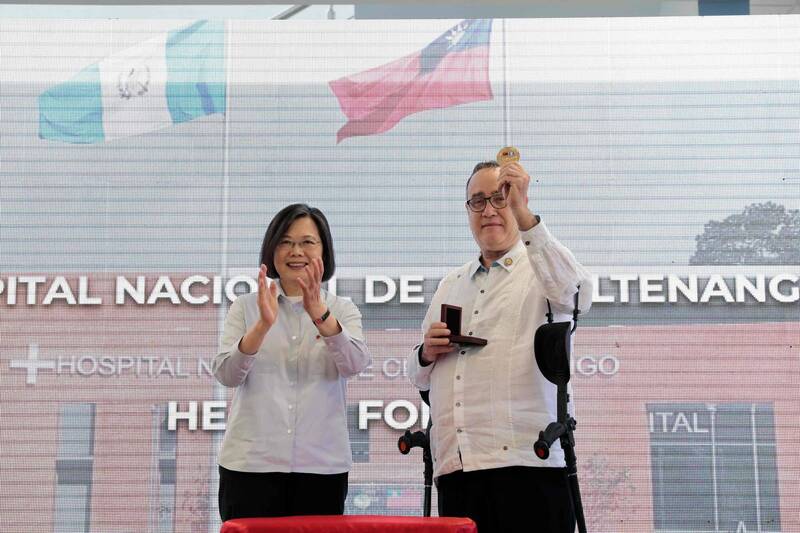President Tsai Ing-wen arrived in Guatemala, a friendly country of the "Partners for Democracy and Common Prosperity Journey", and held talks with Guatemala President Jia Maidai (right).
(AFP)
[Compiled by Chen Chengliang/Comprehensive Report] Chinese President Tsai Ing-wen embarked on a "Journey of Democracy Partners for Common Prosperity", which has triggered repeated threats from China.
The New York Times wrote an article commenting on the 2nd that Tsai Ing-wen created an unprecedented close relationship with the United States. During her tenure, she dealt with the two major democratic and authoritarian powers in the United States and China, expanded Taiwan's foreign relations, and consolidated Taiwan's status.
The article pointed out that Tsai Ing-wen, known for her prudence, is making what may be the last trip abroad before leaving office as one of the most important international leaders.
At the heart of a bitter U.S.-China divide, she steers Taiwan between two major powers with conflicting stances on Taiwan.
She has built a close relationship with the United States during her tenure and has worked hard not to openly confront China while strengthening her defenses in the face of an increasingly belligerent posture.
Please read on...
According to two people who have worked with Tsai Ing-wen, she privately believes that the presidency is like "walking a tightrope."
The New York Times pointed out that Tsai Ing-wen is expected to meet with the Speaker of the US House of Representatives McCarthy this time. However, this is not for a breakthrough in diplomacy, but for Tsai Ing-wen’s need to consolidate the current situation when geopolitical uncertainties are becoming more and more serious. "Taiwan's Place in the Mind of U.S. Leaders".
Stephen Yates, director of the China Policy Program at the America First Policy Institute, pointed out that Tsai Ing-wen is already a "reliable interlocutor" in the eyes of Americans, and "the same is true in other parts of the world." , China's political propaganda operation can hardly portray her as "a robot who is crazy about everything and attacks China".
In addition, Taiwan completed its democratic transition nearly 30 years ago. As Taiwan's president, Tsai Ing-wen established the "closest relationship" with the United States since then, consolidating the United States' unofficial support for Taiwan and making the United States promise military assistance to Taiwan.
The deepening of Taiwan-US relations has allowed countries such as Japan and Europe that do not officially recognize the Taiwan government to expand the space for cooperation with Taiwan.
During the trip, Ms. Tsai appeared calm and relaxed during her brief stop in New York, exuding some of the wry humor she usually only displays with acquaintances.
Patrick M. Cronin, director of the Asia-Pacific Security Program of the American think tank "Hudson Institute", said that Tsai Ing-wen once mentioned in a speech: "My domestic political situation is more complicated than you think, because there are other A political party (the Chinese Communist Party) wants to get involved.”
Cronin bluntly said that every day of Tsai Ing-wen's tenure continued to be pressured and coerced (from China); but she was optimistic and funny, communicating with her American audience like a sophisticated politician.
The New York Times mentioned that in 2011, Tsai Ing-wen visited the United States as the Democratic Progressive Party's presidential candidate to express her views on foreign policy to the Obama administration.
Afterwards, an anonymous U.S. official revealed that Americans "clearly doubted" Tsai Ing-wen's ability and willingness to maintain "stable relations between Taiwan and Beijing."
Zhang Zhihao, who drafted the speeches for Tsai Ing-wen, said that Tsai Ing-wen learned from that failure and began to avoid making public statements that might be seen as provocative to China.
When she visited Washington again in 2015, she has established an image of a "continuous vision" for the DPP: on the premise of not affecting or angering US-China relations, she will work hard to consolidate Taiwan's sovereignty and independent status without making any noise.
Zhang Zhihao said: "She wants to push (promote) Taiwan's position as an independent country; however, pushing to the most active (level) will not make the Americans lose their trust in her."
As President Tsai is leaving office, former American Institute in Taiwan president Raymond Burghardt told The New York Times, "I think the United States will miss her," but the question is whether China thinks the same, or will act because of the next incumbent. Becoming less cautious is a question mark for the future.
